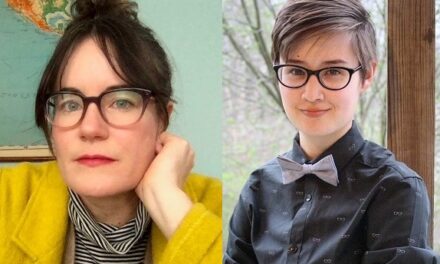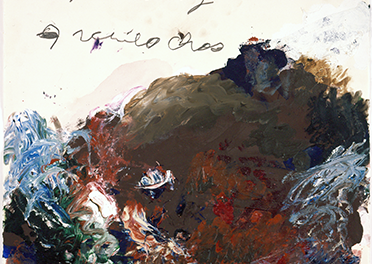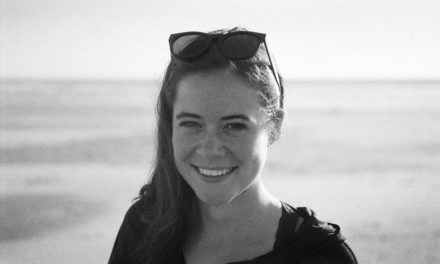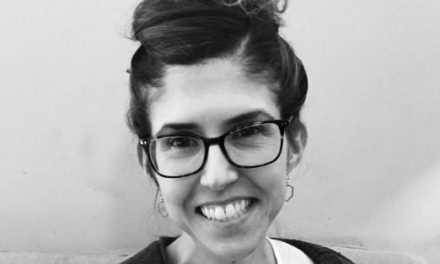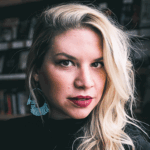 Thanks for stopping by to check out the last poetry Pas de Deux of the season: our second interview between poets and 10.2 contributors Kathryn Nuernberger and Shara Lessley. Below, Nuernberger asks Lessley about her poem “They Ask Me to Send,” one of a series of narrative-lyrics that explore Lessley’s time living in Jordan. Scroll down to learn how she negotiates the autobiographical and speaking selves in her poems, what it’s really like for an American woman to shop for soap in the downtown suqs of Amman, and how spectacular the night sky appears when populated with hundreds of fire balloons at the end of Ramadan.
Thanks for stopping by to check out the last poetry Pas de Deux of the season: our second interview between poets and 10.2 contributors Kathryn Nuernberger and Shara Lessley. Below, Nuernberger asks Lessley about her poem “They Ask Me to Send,” one of a series of narrative-lyrics that explore Lessley’s time living in Jordan. Scroll down to learn how she negotiates the autobiographical and speaking selves in her poems, what it’s really like for an American woman to shop for soap in the downtown suqs of Amman, and how spectacular the night sky appears when populated with hundreds of fire balloons at the end of Ramadan.
Kathryn Nuernberger: “They Ask Me to Send” makes me want to reread Edward Said and Elizabeth Bishop. Which writers were you thinking about when you wrote the poem?
Shara Lessley: I’m very interested in how Americans romanticize and deride the Middle East (sometimes in the same breath), although Said’s Orientalism certainly wasn’t on my desk during the drafting process. What I remember most about “They Ask Me to Send” is the moment that triggered the poem. My husband and I were having drinks on a patio overlooking Amman’s many hills, its downtown maze of suqs and mosques. We’d only lived in the Middle East a few weeks and I couldn’t make sense of what I was seeing. Drifting over the rooftops and then across the face of the Citadel, there they were—the “paper chambers” Bishop so perfectly depicts in “The Armadillo,” the ones that “flush and fill with light / that comes and goes, like hearts.” Fire balloons! I couldn’t believe my luck. Unlike Bishop’s illegal balloons, however, the globes weren’t “rising toward a saint / still honored in these parts” but launched to celebrate the final hours of Ramadan.
KN: Your bio in Cincinnati Review indicates that you are a “recent resident of the Middle East,” which reinforces inclinations readers might have to think of this poem as nonfiction. The speaker castigates family and friends of the family, and the poem approaches an emotional climax with frustrating phone calls from the speaker’s mother. How do you think about the line between yourself in the world and yourself on the page?
SL: The three years I lived in Amman were a privilege. However, even as I did my best to immerse myself in the language and traditions, to learn as much as I could about the country and its people, to engage respectfully with its values and flaws, I remained an outsider. Another American passing through. “They Ask Me to Send” is less castigating of others than of the cultural script we’ve been given of the region (enter Said?). The first questions I’m asked about Jordan almost always concern safety and sexism. At no time while bartering for soap or scarves was I ever Carrie Bradshaw—you know the cartoonish Middle Eastern scene in the Sex and the City movie where Carrie and company traipse through the suq like circus clowns while crowds of hostile Arabs gape and stare?
We often ask readers to separate the speaker from the author—and for good reason. In this case, the speaker is clearly me, although my mother never demanded “a precise ‘timeline’ detailing / our stateside return.” (Sorry Mom!) What’s true is that expats are often asked for stuff. Trinkets. Recipes. Evidence of a life abroad. “They Ask Me to Send” takes stock of the care packages I shipped from Jordan. I mailed Dead Sea products, mosaics, Lebanese sweets. A lot of coffee. Miniature flags and stickers and stuffed animals (camels mostly) that were probably made in China. The boxes were filled with good intentions, but failed to convey a life lived. No matter how hard I tried, I could never send what makes Amman so magical—the generosity of its people, for instance, “the air at Aaron’s tomb,” or fire balloons drifting over columns from the Temple of Hercules, fragments more than six thousand years old.


